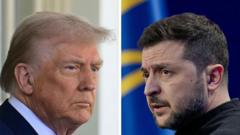This Sunday marks a significant day in German politics as voters are set to elect their new chancellor amidst pressing economic issues and growing tensions influenced by international politics. Favoring the conservative Friedrich Merz of the Christian Democratic Union (CDU), the election comes at a time when the country is grappling with stagnant growth and increasing dissatisfaction. The far-right Alternative for Germany (AfD) party is also gaining traction, despite its controversial associations.
Germans Vote Amidst Rising Tensions and Economic Struggles

Germans Vote Amidst Rising Tensions and Economic Struggles
As Germany prepares for its pivotal chancellor elections on Sunday, the atmosphere is charged with economic anxiety and geopolitical uncertainties.
Economically, Germany faces a crisis marked by dwindling competitiveness, especially within its vital auto manufacturing sector. Voters are expressing frustration towards the current government led by Chancellor Olaf Scholz, with expectations of change. Another critical issue steering voter sentiment is immigration, especially as the nation navigates the complex integration of millions of refugees over the last decade, sparked by a rise in anxiety following a series of incidents linked to the immigrant community.
In the backdrop of these domestic issues, the impact of U.S. President Trump’s administration looms large over the election, particularly after recent developments involving Ukraine. While traditionally critical of Trump, actions from his administration that directly affect Europe’s peace negotiations have suddenly resonated with voters, prompting a reconsideration of the implications on Germany's future.
As Germany enters this decisive electoral period, the implications of the chosen leadership will ripple throughout Europe, shaping not only domestic policies but also international relationships in an increasingly fragmented geopolitical landscape.
The outlook remains uncertain as Germans prepare to make crucial decisions that may reshape their nation's trajectory amidst evolving global challenges.
In the backdrop of these domestic issues, the impact of U.S. President Trump’s administration looms large over the election, particularly after recent developments involving Ukraine. While traditionally critical of Trump, actions from his administration that directly affect Europe’s peace negotiations have suddenly resonated with voters, prompting a reconsideration of the implications on Germany's future.
As Germany enters this decisive electoral period, the implications of the chosen leadership will ripple throughout Europe, shaping not only domestic policies but also international relationships in an increasingly fragmented geopolitical landscape.
The outlook remains uncertain as Germans prepare to make crucial decisions that may reshape their nation's trajectory amidst evolving global challenges.






















